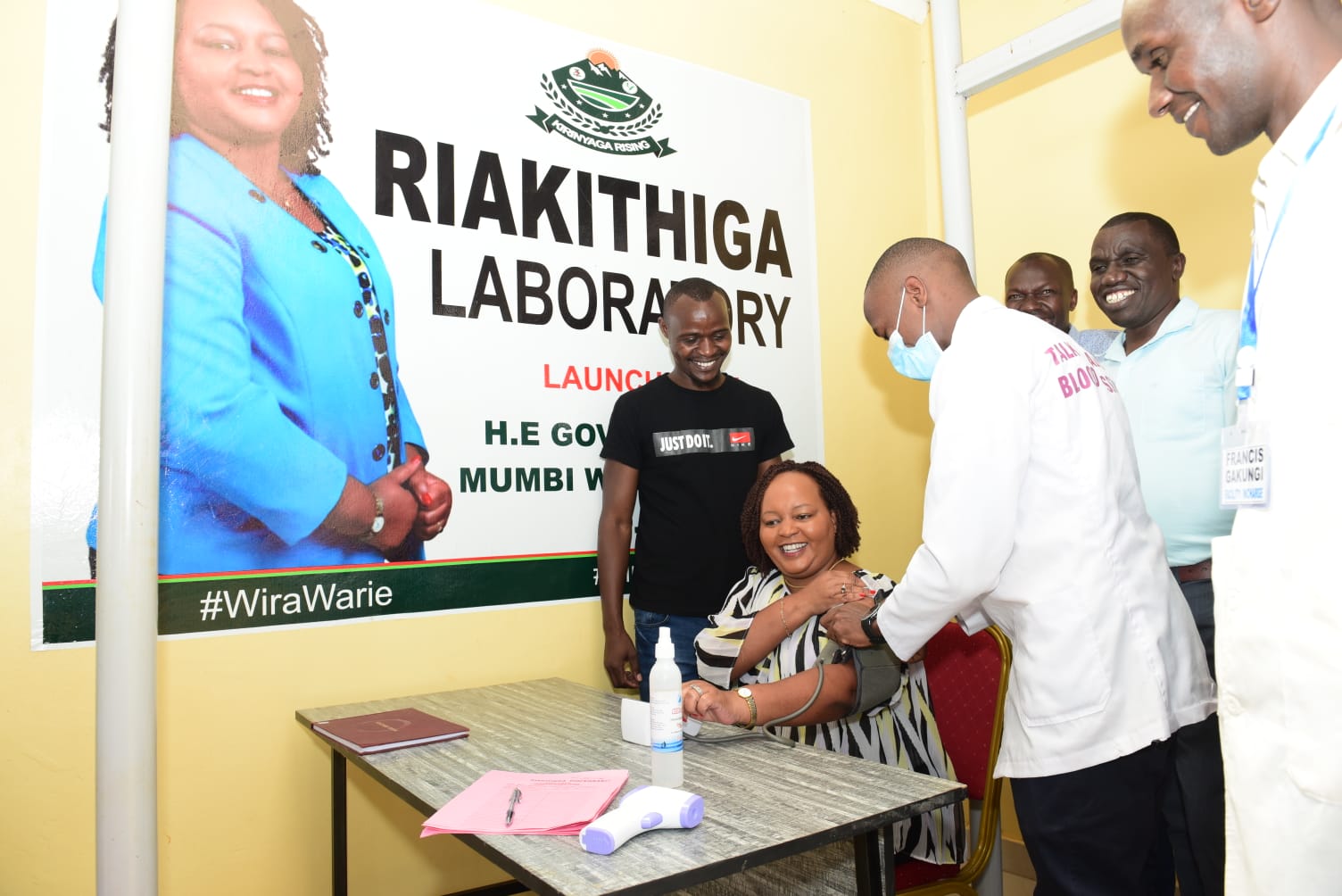Residents of Riakithiga in Kabare ward, Gichugu are elated as Governor Anne Waiguru on Thursday opened a medical laboratory at Riakithiga Dispensary.
The dispensary that has been serving over 10,000 residents will now offer more comprehensive medical services thus saving the residents from the inconvenience of being directed to other facilities such as Kerugoya Hospital or Kabare Health Center.
Such referrals have at times being an impediment to timely diagnosis and treatment.
Speaking when officially commissioning the laboratory, Kirinyaga Governor Anne Waiguru said that the impact of the facility extends beyond the immediate vicinity of Riakithiga, as it will also serve residents from neighboring areas such as Ithare, Ngungu, Kabare, and part of Baragwi ward.
“By providing timely and reliable laboratory services to the community, the health and well-being of thousands of individuals will be greatly enhanced”, said Waiguru.

The new laboratory will offer essential tests for diseases such as TB, Blood Sugar, and antenatal profiles, contributing significantly to disease detection and early intervention.
“The opening of this laboratory marks a milestone in a series of healthcare initiatives in Kirinyaga. As the 9th health facility to be completed among 20 dispensary and health center projects, it signifies our commitment to improving healthcare accessibility for all Kirinyaga people”, added Waiguru.
Previously operationalized facilities, including Kiamwathi, Kianjiru, Joshua Mbai, Kamwana, Umoja, Kiaumbui, Matandara, and Mucagara, have already had a positive impact on their respective communities.
The governor noted that with a focus on developing and upgrading healthcare facilities, the government aims to save citizens from the burden of long-distance travel and excessive expenditures in search of medical services.
By reducing the need for referrals and enhancing primary healthcare services at local dispensaries, the overall morbidity and mortality rates in the catchment areas are expected to decline.
In addition to the Riakithiga laboratory, the elevation of the Kerugoya County Referral Hospital from level 4 to level 5 and the ongoing upgrading of Kianyaga and Kimbimbi Hospitals to level 4 facilities demonstrate the County government’s dedication to providing comprehensive medical services to its citizenry.
To further support healthcare initiatives, Waiguru said that the implementation of the Hospital Management Information System (HMIS) has enabled more effective management of medical supplies and resources in the connected facilities.
Waiguru said that beyond infrastructure development, the county government is placing emphasis on promoting healthy communities through public education on disease prevention and control. To empower Community Health Promoters (CHPs) and strengthen their roles, a monthly stipend of Ksh. 5,000 will be provided, along with medical kits to facilitate basic tests.
At the same time governor Waiguru distributed High-Density Polethylene (HDPE) pipes for the Rukenya Irrigation Water project which will benefit around 1,000 people who will now be able to efficiently transport water from River Thiba to their farms.
Availability of irrigation water will reduce dependency on rainfall and increase the production of horticultural crops including tomatoes, French beans, vegetables, and maize.
“This financial year, the county government is planning to spend Ksh. 293.4 Million on various projects including rehabilitation of Mwea irrigation scheme canals, Rwamukia, Sorothimu, Kiandura, and Kegeki water projects, which will likely have a positive impact on water availability in these areas”, said Waiguru while distributing the pipes.
Waiguru also said that the planned construction of South Ngarima-Murinduko, Nyamindi, and Gikumbo dams will also significantly increase land under irrigation, allowing for greater crop production and potentially benefiting more farmers.
On the decision to streamline the management of water companies by putting them under the County Government, Waiguru said that that the move was in compliance with the Water Act 2016.
She added that it will make water companies eligible for funding from donors that exclusively partner with governments, which could lead to further improvements in water supply and service delivery.
She reiterated her administration’s commitment to providing accessible and quality water for domestic and irrigation use for county residents.





